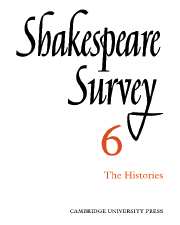Book contents
- Frontmatter
- Shakespeare's History plays: 1900-1951
- The Unity of 2 Henry IV
- Anticipation and Foreboding in Shakespeare’s Early Histories
- Middle-Class Attitudes in Shakespeare’s Histories
- A Reconsideration of Edward III
- On Producing Henry VI
- The Huntington Library
- An Early Elizabethan Playhouse
- Shakespeare Learns the Value of Money: The Dramatist at Work on Timon of Athens
- Shakespeare’s French Fruits
- An Elizabethan Eyewitness of Antony and Cleopatra?
- Othello’s “It is the cause . . .”: An Analysis
- On Translating Hamlet
- Shakespeare in China
- International Notes
- Shakespeare Productions in the United Kingdom: 1951
- Shakespeare’s History Plays - Epic or Drama?
- Festival Shakespeare in the West End
- The Year's Contributions to Shakespearian Study 1 Critical Studies
- 2 Shakespeare’s Life, Times and Stage
- 3 Textual Studies
- Books Received
- Index
- Plate Section
Shakespeare in China
Published online by Cambridge University Press: 28 March 2007
- Frontmatter
- Shakespeare's History plays: 1900-1951
- The Unity of 2 Henry IV
- Anticipation and Foreboding in Shakespeare’s Early Histories
- Middle-Class Attitudes in Shakespeare’s Histories
- A Reconsideration of Edward III
- On Producing Henry VI
- The Huntington Library
- An Early Elizabethan Playhouse
- Shakespeare Learns the Value of Money: The Dramatist at Work on Timon of Athens
- Shakespeare’s French Fruits
- An Elizabethan Eyewitness of Antony and Cleopatra?
- Othello’s “It is the cause . . .”: An Analysis
- On Translating Hamlet
- Shakespeare in China
- International Notes
- Shakespeare Productions in the United Kingdom: 1951
- Shakespeare’s History Plays - Epic or Drama?
- Festival Shakespeare in the West End
- The Year's Contributions to Shakespearian Study 1 Critical Studies
- 2 Shakespeare’s Life, Times and Stage
- 3 Textual Studies
- Books Received
- Index
- Plate Section
Summary
[These notes on the difficulties confronting the Chinese translator of Shakespeare relate to the period before 1950. Recent changes in social life create conditions of an entirely different kind.]
The Problems of Translation
Of all the difficulties of producing Shakespeare in China, the greatest are the differences in social etiquette, the language barrier, and the method of translation.
According to old Chinese etiquette, a man cannot touch the hand of a woman. If he should give anything to her, he must put it upon a table instead of handing it to her directly. In spite of many changes during the present century, the same basic principle still holds. Even husband and wife cannot walk hand in hand, or embrace, or kiss in public. Things like that are reserved only for the chamber. Otherwise they are considered as not only vulgar but indecent. That is why on the traditional Chinese stage Duncan cannot say to Lady Macbeth "Give me your hand". That is not courtesy, but seduction.
A compliment, especially a compliment to a lady, is better implied than expressed. We seldom say things like "You are beautiful", even when we are in love. A mere silent admiration is enough. If we should say to a girl things like "You are as beautiful as Helen", we might incur a double charge of hinting that her behaviour is as light as that of Helen and that her only virtue is her beauty. To say the least, she would wonder whether that is a suggestion of an elopement. The chief charm of a young lady is her virtue and not her beauty. Duncan's "Fair and noble hostess, We are your guest to-night" when literally translated would certainly mislead the audience.
- Type
- Chapter
- Information
- Shakespeare Survey , pp. 112 - 116Publisher: Cambridge University PressPrint publication year: 1953

